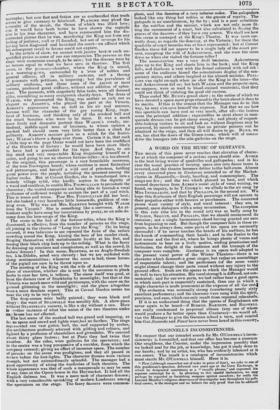BUNN'S GREAT EFFORT.
AT length the Manager of the two " National " Theatres has- shown us what he can effect by the united forces of his two com- panies brought together on one stage. Tragedy and comedy having been played to all but empty benches, the Les ee gets up a spectacle Co "amaze the very faculties of eyes and ears. The house was crowded to the slips on the first night ; but will this last? BUNN has found it an easy task to disgust the au- diences with the "Legitimate Drama,' bastardized in the per- formance; but it is not so easy a matter to please the public with inexplicable dumb-show and noise. The much talked-of opera of Gustavus the Third is a worse failure than even Robert the Devil. It is not comparable with. it either in romantic interest or in splendour of pageantry. Robert the Devil had two or three effective scenes; Gustavus has but one masked ball : and that, splendidly as it was got up in Par*, owed its attraction chiefly to. the people of fashion who mingled. with the maskers on the stage. The plot of PLANCHE'S version at Covent Garden varies from- the original. It seems there was no e in the combined companies of "the houses twain of Covent Garden. and of Drury Lane" who was competent to personate the Kine • and so PLANCHE has made a virtue ofnecessityand represented in his historical character of a moral monarch, and given the love- ditties to-another. But in getting the King's character out of the.. . mud, he has dragged that of the lady deeper in the mire. • See the- consequences of not having an actor and tenor-singer like NOVA- RIT! Madame Arrkerstroem may bring an action against BUNN for defamation. Before, all was fiction except the names and the ca- tastrophe;, but now fact andlletion are so confounded that truth serves to give currency to falsehood. PL A NONE may. plead the secessity of the music, the theme of which was illicit love; else it would have beeh better to have shown the regicide also in his true character, and have represented him the dis- contented plotter that he was, murdering the King not from any feeling of jealousy, well or ill founded, but out of revenge fbr his having been disgraced and banished the court—an affront which his subsequent recall to favour could not expiate. In the article of show, we cannot with justice bestow such un- qualified praise as some of our con-emporaries. The persons on the stage were numerous enough, to be sure ; but the dresses were by no means equal to what we have seen in theatres The first scene, in the presence-chamber, where the King is seated, in a morning-gown, surrounded by a levee of nobles and general officers, all in military costume, and a throng of peasants with petitions, is imposing; but the prevalence of military uniforms, and those none of the gayest or most various, produced great stiffness, without any addition of splen- dour. The peasants, with singularly false taste, were all dressed alike, resembling so many overgrown charity-boys. The dress of Wsene, who personated the King, was neither so rich nor so elegant as Aituoris, who played the part at the Victoria. Aneorr's appearance too, as well as his air and manner, became well the character of the gay young King, impa- tient of business, and thinking only of the masked ball and the court beauties who were to be there. It was a much more lively and dramatic portrait than WARDE'S steady, me- thodical, middle-aged man of business, to whose opinion a masked ball should seem very little better than a cloak for gallantry. Amu:iris manner gave us a relish for the festivi- ties ; W ARDE'S threw a damp over them. Certain it is, that such a little imp as the page Oscar would not have been the confidant of the Gustavus of history : he would have been more likely camp does the love-songs of the King. WILSON, SEGUIN, and PHILLIPS, that we should recommend. its wore a more desolate aspect. This at Covent Garden seems too The orchestra was unusually strong .(numbering- nearly sixty '
near the city to be very lonely, excellent performers); and the choruses were sung with the gpirit, , The drop-scenes . were badly painted; they were black and precision, and ease, which can only result from repeated rehearsals.
dingy : the want of STANFIELD was sensibly felt. A show-piece If it is an understood thing that the operas of Englishmen are without:SasssrsieLn's scenery, is like a sky without a sun. Here never again to be heard—if BISHOP, BARNETT, and RoowELL as elother instance of what the union of the two theatres under are really condemned to perpetual silence (any one of whom on lessee has not effected. would produce a far better opera than Gustavus)—we. would ad- .
good opportunity of airing the wardrobes of both theatres. The " Firsf(although somewhat out of order in point of date), we refer to one of whole appearance was that of such a masquerade as may be seen this gentleman's speeches, delivered two years ago at the Corn Exchange, in at any. time at the Opera-house in the Haymarket. It had all the which he designated consistency as a "rascally phrase," and expressed. hie English dulness too. It was a mere mob of character dresses ; perhaps be regarded as furnishing weapons against ourselves; for really the with a very considerable sprinkling of modern Londoners among Learned Member's religious observance of that singular text throughout his poll. the, spectators on, the stage. The fancy dancers were common- sisal career, is the strongest and we believe the only proof that can be adduced
place, and the daneing-of a-very inferior order. The stalopaders.
looked like any thing but nobles or the guests of royalty. The galopade is an anachronism, by the by ; and is a poor substitute for the cotillon and the minuet,, which are not only more fit- ting the ceremonial of a court, but also calculated to display the graces of the daucers—if they have any graces. We shall see how this scene is managed at the-Kings Theatre. It was more cor- rectly done, as regards the dancing, at the Victoria ; for there the quadrille of court beauties was at least represented: but at Covent Garden there did not appear to be a single lady of the court pre- sent, excepting the wife of Ankerstroem, and she wore the same dress as when she visited the fortune-teller!
The assassination was a very droll business. Ankerstroem gsies up to the King and shoots him in the back ; and the King falls, and discloses a vest with the breast coloured with red ink s •
some of the audience hissed the ostentatious display of the san- guinary stains, and others laughed at the absurd mistake. PHIL-
LIPS was right enough when he shot the King in the loins—the real Ankerstroem did so; but both WARDE and the property-man, we suppose, were so used to blood-stained waistcoats, that they could not think of violating the good old custom.
Thus ended Mr. BUNN'S grand show ; to the notice of which we have devoted a space more propcstioned to the bruit about it than to its merits. If this is the utmost that the Manager can do in this way, he may e'en save himself the expense. Not that we see how this spectacle can have cost so very much, after all—the lustres seem the principal addition : ragamuffins to strut about in mas- querade dresses can be got cheap enough ; and plenty of respect- able-looking visitors to sit and look on without disguises may be procured, by merely announcing that no private persons can be admitted to the stage, and then all will desire to go. BUNN, we see, has shut the doors of the Green-room; which will of course drive the loungers into the side-galleries on the stage.



















 Previous page
Previous page